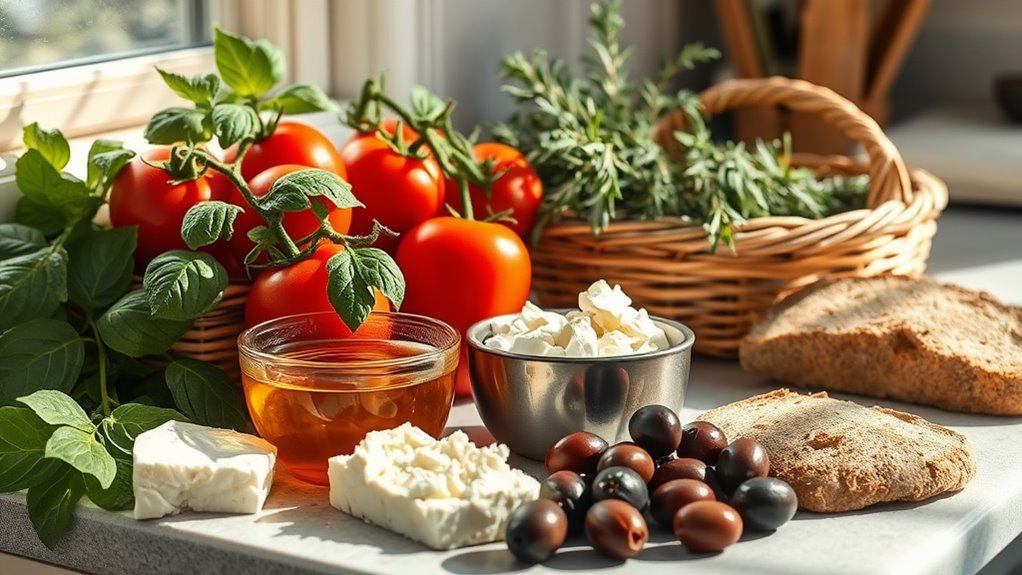To fully embrace the Mediterranean diet, you should always have fresh vegetables like leafy greens and tomatoes in your kitchen. Stock up on whole grains such as quinoa and brown rice, plus healthy fats like olive oil and avocados. Lean proteins, including fish, chicken, and legumes, are key, along with aromatic herbs like basil and oregano to enhance flavor. Don't forget dairy products like Greek yogurt and essential pantry items like canned tomatoes and chickpeas for convenience. These staples will support a nutritious lifestyle. You'll discover even more essential ingredients and tips for cooking that fit your Mediterranean-inspired meals.
Key Takeaways
- Always stock fresh vegetables like leafy greens, tomatoes, and peppers to ensure nutrient-rich meals.
- Keep a variety of whole grains such as quinoa and brown rice for healthy, filling sides.
- Include legumes like lentils and chickpeas for protein and fiber in your diet.
- Use healthy fats like olive oil and avocados to enhance flavor and nutrition in dishes.
- Have canned goods like tomatoes and chickpeas on hand for quick and easy meal preparation.
Fresh Vegetables
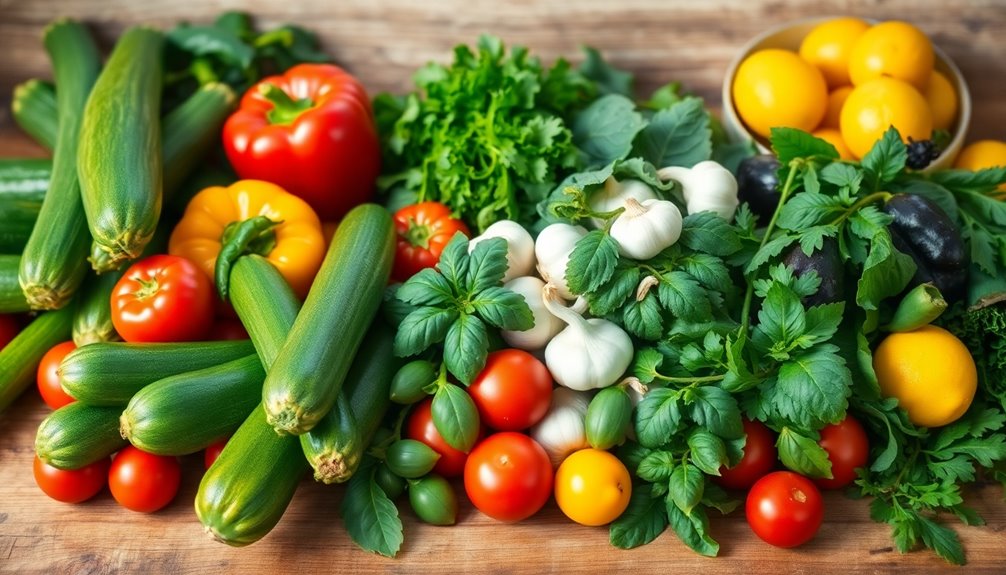
When you embrace the Mediterranean diet, fresh vegetables become a cornerstone of your meals, providing essential nutrients and vibrant flavors. Incorporating a variety of vegetables not only enhances your dishes but also supports your overall health.
Leafy greens, tomatoes, peppers, and eggplants are just a few examples of the colorful produce you can enjoy.
To make the most of these fresh ingredients, consider visiting local farmers markets. These markets often offer seasonal vegetables that are picked at their peak ripeness, ensuring you get the best taste and nutritional value. Plus, buying directly from farmers fosters a sense of community, connecting you to those who grow your food.
Meal prep can be a game-changer in integrating fresh vegetables into your routine. Dedicate a few hours each week to wash, chop, and store your produce. This way, when you're ready to cook, your vegetables are prepped and ready to go.
You might roast a medley of seasonal veggies or whip up a salad in minutes. Having fresh, colorful ingredients on hand can inspire creativity in the kitchen, allowing you to experiment with different flavors and textures. Additionally, a plant-based diet can significantly enhance your meals by providing a wealth of health benefits and delicious options.
Whole Grains
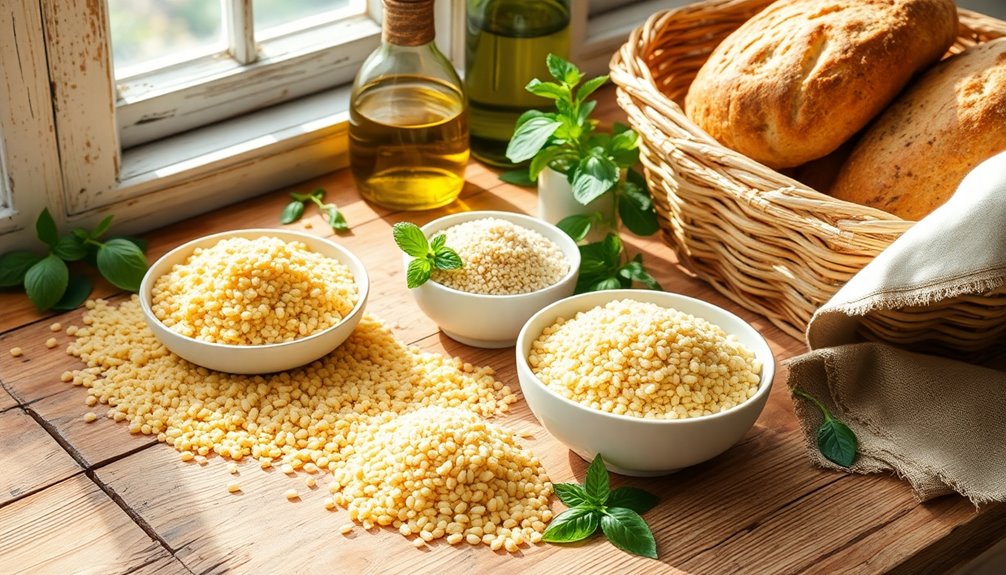
Whole grains are an essential component of the Mediterranean diet, offering not only a rich source of nutrients but also a range of health benefits. Incorporating whole grains like quinoa and brown rice into your meals can enhance your overall well-being while keeping your taste buds satisfied.
Quinoa is a fantastic choice due to its complete protein profile, making it an excellent option for vegetarians and anyone looking to increase their protein intake. You can experiment with various quinoa recipes, such as salads, bowls, or even stuffed peppers. Its versatility means you can pair it with fresh vegetables or lean proteins, creating meals that are both nourishing and delicious.
Brown rice benefits are equally impressive. This whole grain is high in fiber, which can help you feel fuller longer and support digestion. It's also rich in antioxidants and essential minerals like magnesium. Additionally, incorporating variety of delicious Keto recipes can offer new and exciting ways to enjoy whole grains in your diet.
You can easily swap white rice for brown rice in your favorite dishes, whether it's stir-fries, casseroles, or simple bowls.
Healthy Fats
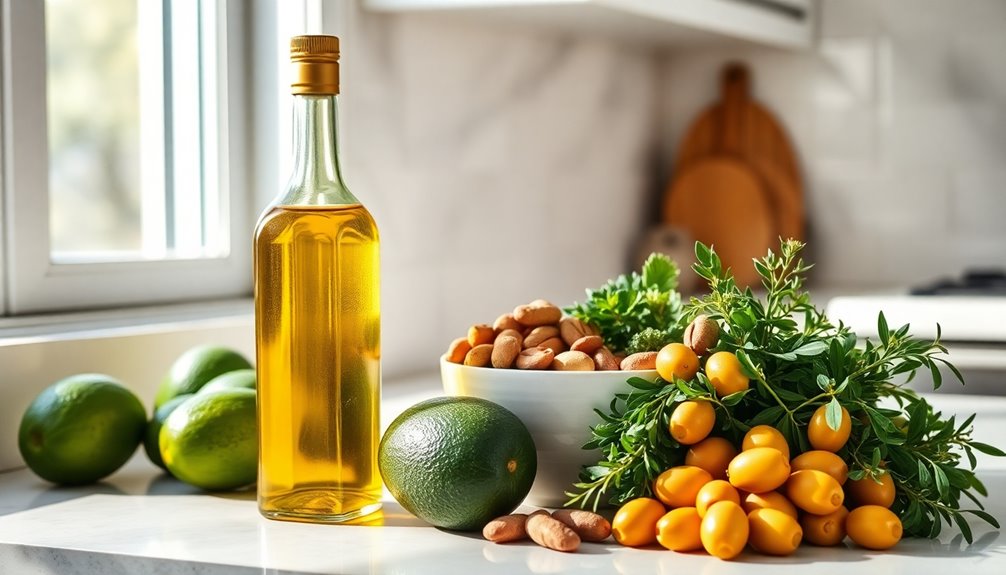
Incorporating healthy fats into your Mediterranean diet not only enhances flavor but also provides numerous health advantages. One of the most celebrated sources of healthy fat is olive oil. Its benefits are backed by research; it's rich in monounsaturated fats, which can improve heart health by lowering bad cholesterol levels. Using olive oil in dressings, marinades, or drizzling it over roasted vegetables can elevate your meals while keeping them nutritious.
Avocados are another fantastic source of healthy fats. Their creamy texture and subtle flavor make them incredibly versatile. You can mash them for spreads, slice them into salads, or blend them into smoothies for added creaminess. Avocado uses extend beyond taste; they're loaded with fiber and essential nutrients that support digestion and overall wellness. Additionally, research indicates that incorporating monounsaturated fats into your diet can play a significant role in managing conditions like Type 2 diabetes.
Lean Proteins
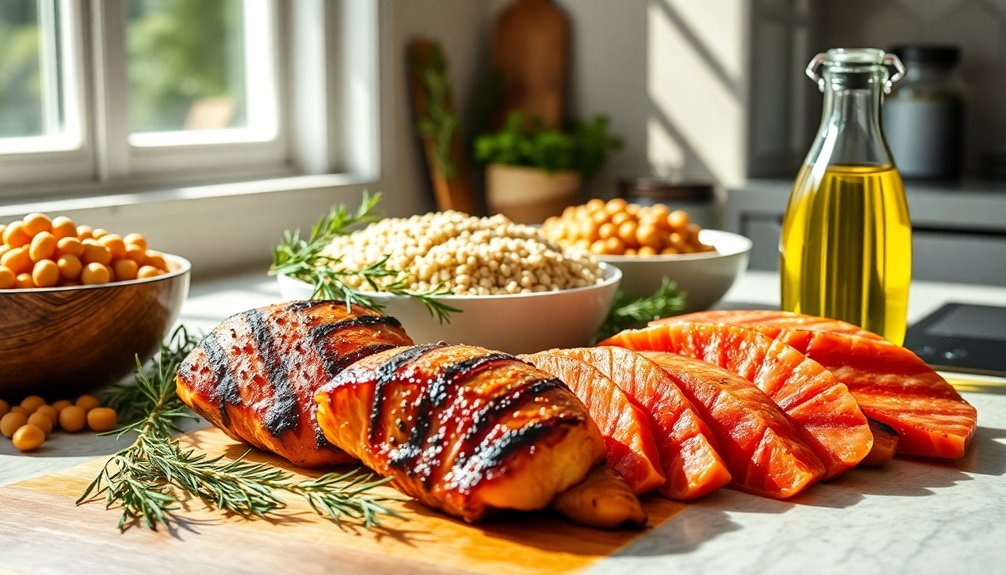
At the heart of the Mediterranean diet lies a focus on lean proteins, which play an essential role in maintaining muscle health and overall wellness. Incorporating a variety of protein sources in your meals not only supports your body but also promotes a sense of community and shared meals with loved ones.
When it comes to choosing lean proteins, consider options like chicken, turkey, fish, legumes, and plant-based proteins such as tofu and tempeh. Fish, particularly fatty varieties like salmon and sardines, provide heart-healthy omega-3 fatty acids while being low in saturated fat. Legumes, including lentils and chickpeas, are fantastic sources of protein and fiber, making them perfect for vegetarian or vegan diets. Additionally, many people on a vegan diet require more protein, making whole food sources of protein an important consideration for meal planning.
You can experiment with different cooking methods to enhance the flavors and health benefits of these proteins. Grilling, baking, and steaming are excellent techniques that help retain nutrients while reducing the need for added fats.
For instance, grilling chicken or fish can infuse a smoky flavor without excess calories. Alternatively, try a comforting lentil stew simmered with fresh vegetables, which can be a hearty centerpiece for any gathering.
Incorporating lean proteins into your Mediterranean diet can foster connection and enjoyment around the dinner table. As you explore various protein sources and cooking methods, you'll discover new ways to nourish yourself and create lasting bonds with others who share your passion for healthy living.
Aromatic Herbs
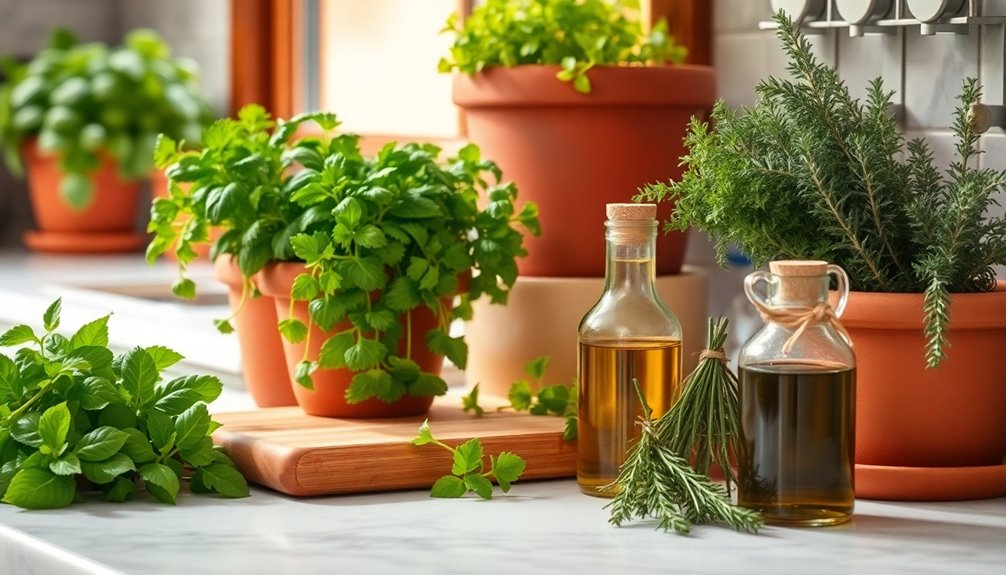
Aromatic herbs are essential to the Mediterranean diet, with their vibrant flavors and numerous health benefits enhancing both dishes and overall well-being. These flavorful additions not only elevate your meals but also provide various culinary uses that make cooking an enjoyable experience. By incorporating herbs into your cooking techniques, you can create dishes that are both delicious and nutritious. Additionally, understanding and applying age-old health practices can lead to improved well-being and vitality.
Here's a quick reference table of some popular aromatic herbs you should always have on hand:
| Herb | Culinary Uses | Health Benefits |
|---|---|---|
| Basil | Pesto, salads, sauces | Anti-inflammatory, rich in antioxidants |
| Oregano | Marinades, roasted vegetables | Supports digestive health, antimicrobial |
| Rosemary | Soups, grilled meats | Improves memory, boosts mood |
| Thyme | Soups, stews, dressings | Rich in vitamins, supports respiratory health |
| Parsley | Garnish, salads, sauces | High in vitamins A, C, and K |
Using these herbs can transform simple dishes into flavorful masterpieces. For instance, fresh basil adds a burst of freshness to a Caprese salad, while oregano can enhance the flavor of roasted vegetables. Additionally, many aromatic herbs, like rosemary and thyme, are known for their health benefits, including anti-inflammatory properties and support for digestion.
Spices and Seasonings
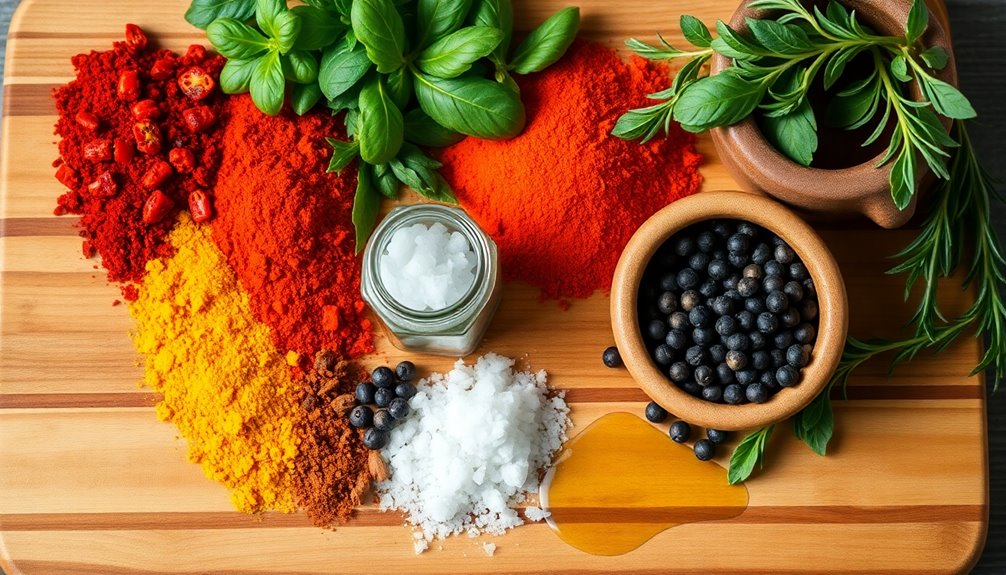
Many people might underestimate the impact of spices and seasonings in the Mediterranean diet, but these flavorful elements play an essential role in enhancing taste and promoting health. They not only add depth to your dishes but also provide numerous health benefits, making them indispensable for anyone looking to embrace this vibrant lifestyle.
To help you infuse your meals with Mediterranean flair, here are four must-have spices and seasonings:
- Oregano: A staple in many traditional blends, oregano's earthy flavor pairs beautifully with tomatoes and grilled meats.
- Cumin: This warm spice brings a hint of nuttiness to your dishes and works wonderfully in stews and roasted vegetables.
- Paprika: Offering a sweet or smoky kick, paprika can elevate anything from hummus to grilled fish, providing a burst of color and flavor.
- Cinnamon: Often overlooked, cinnamon adds a unique warmth to both savory and sweet dishes, enhancing your culinary creativity. Additionally, incorporating varied spices can help mitigate the negative effects of traditional bread on health, allowing for a more balanced diet.
Dairy Products
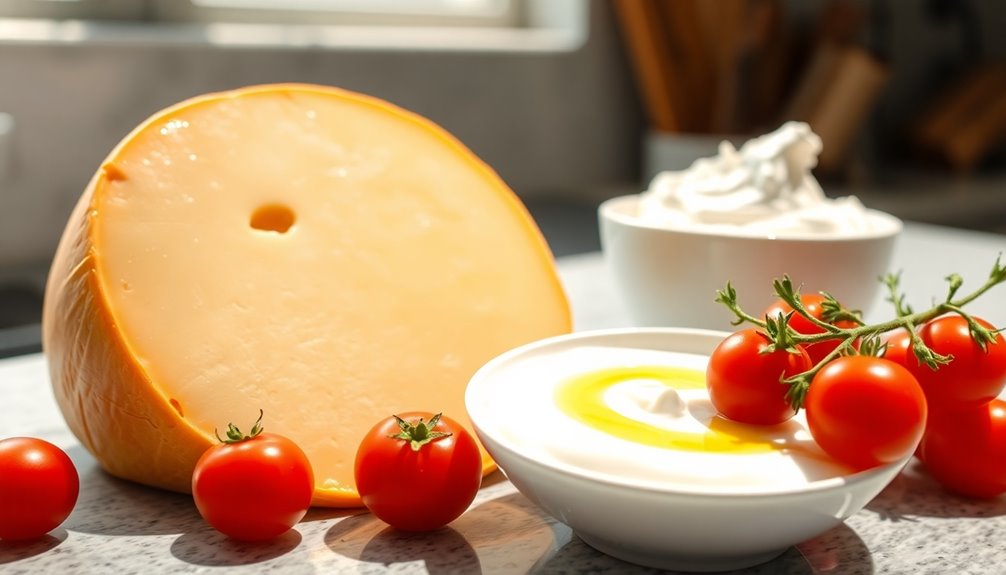
When you think of the Mediterranean diet, dairy products mightn't be the first thing that comes to mind, but they play a significant role in this culinary tradition. Incorporating dairy into your meals can add both flavor and nutrition, making it a staple you shouldn't overlook.
One of the highlights of Mediterranean dairy is the variety of nutrient-rich cheeses available. From feta to ricotta, these cheeses not only enhance your dishes but also provide essential calcium and protein. Feta, for instance, is perfect for salads, while ricotta can be a delightful addition to pasta dishes or desserts. These cheeses can elevate your meals without overwhelming them, allowing you to enjoy their flavors in moderation.
Creamy yogurts are another important component. Greek yogurt, in particular, is known for its thick texture and high protein content. It's an excellent base for smoothies, dressings, or even as a substitute for sour cream. Plus, its probiotic properties can aid digestion, contributing to your overall health. Additionally, incorporating dairy can help support the body's energy metabolism, which is vital for sustained energy levels throughout the day.
Incorporating these dairy products into your Mediterranean-inspired meals not only supports your nutritional needs but also fosters a sense of community around shared meals. Whether you're enjoying a cheese platter with friends or crafting a yogurt-based dip for a family gathering, dairy can bring people together. So, stock your kitchen with these staples and savor the flavors of the Mediterranean while nourishing your body.
Legumes and Pulses
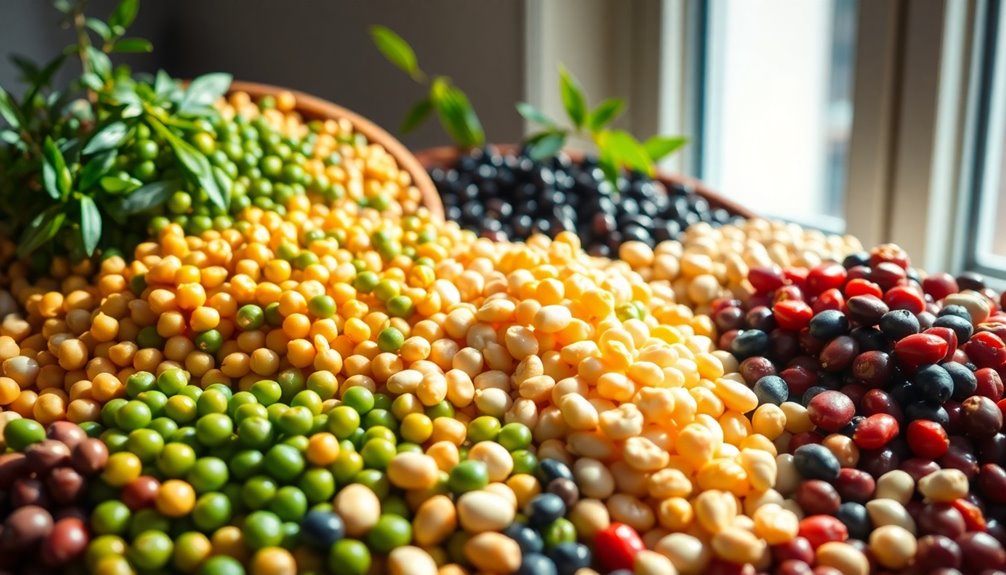
Legumes and pulses take center stage in the Mediterranean diet, offering a powerhouse of nutrition that shouldn't be overlooked. Packed with protein, fiber, and essential nutrients, they're a fantastic addition to your meals, helping you feel full and satisfied. Incorporating legumes into your diet can lead to numerous health benefits, including improved heart health and better digestion. Additionally, they can complement other fitness routines, such as mini band workouts, enhancing overall muscle health and endurance.
To make the most of legumes and pulses in your kitchen, consider these cooking techniques and meal prep suggestions:
- Soaking: Soak dried beans overnight to reduce cooking time and enhance digestibility.
- Cooking methods: Try boiling, pressure cooking, or slow cooking to bring out the best flavors and textures.
- Recipe ideas: Create hearty dishes like lentil soup, chickpea salad, or black bean tacos that aren't only nutritious but also delightful.
- Batch cooking: Prepare large quantities of legumes and store them in the fridge or freezer for quick, easy meals throughout the week.
Nuts and Seeds
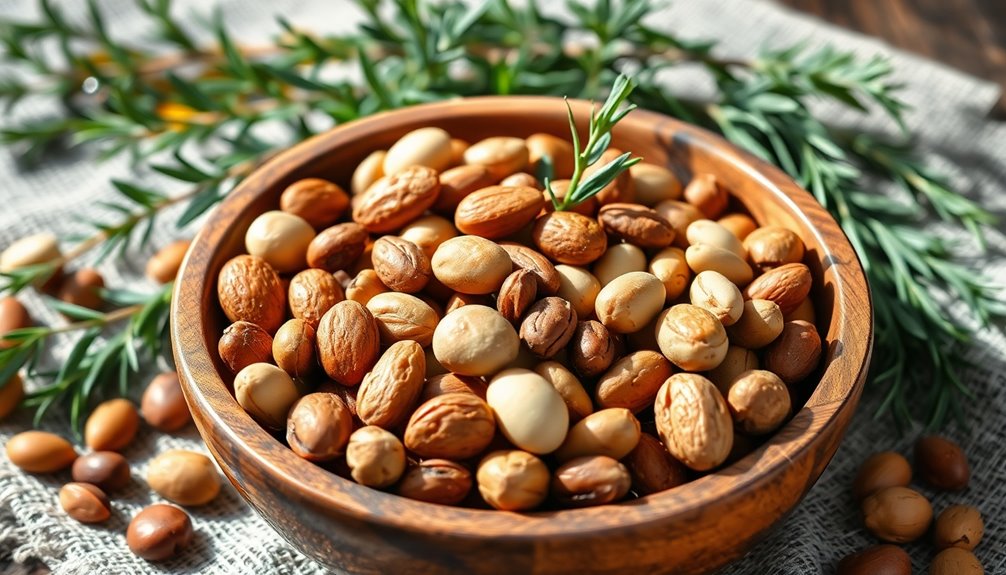
Nuts and seeds play an essential role in the Mediterranean diet, bringing a wealth of nutrients and healthy fats to your meals. These small powerhouses are rich in protein, fiber, vitamins, and minerals, making them a fantastic addition to your daily nutrition. Almonds, walnuts, sunflower seeds, and chia seeds are just a few examples that not only enhance flavor but also provide numerous nutritional benefits, such as heart health support and improved metabolic function.
Incorporating nuts and seeds into your diet is easier than you might think. You can enjoy them as snacks, sprinkle them on salads, or blend them into smoothies for an added nutritional boost. Roasting nuts with olive oil and herbs is a simple cooking technique that enhances their flavor and crunch, making them irresistible.
Alternatively, you can grind seeds into a powder to use as a thickener for soups or sauces, adding both texture and health benefits. Additionally, consuming nuts and seeds can help activate strong, round, healthy butt by providing essential nutrients necessary for overall muscle function.
When it comes to portion sizes, remember that moderation is key. A handful a day is often sufficient to reap the rewards without consuming excessive calories. By keeping a variety of nuts and seeds in your kitchen, you create opportunities for creativity in your meals while nurturing your body. So, stock your pantry with these nutritious staples, and you'll find it easy to embrace the Mediterranean lifestyle, fostering a sense of belonging to a community that values health, flavor, and wholesome eating.
Canned Goods
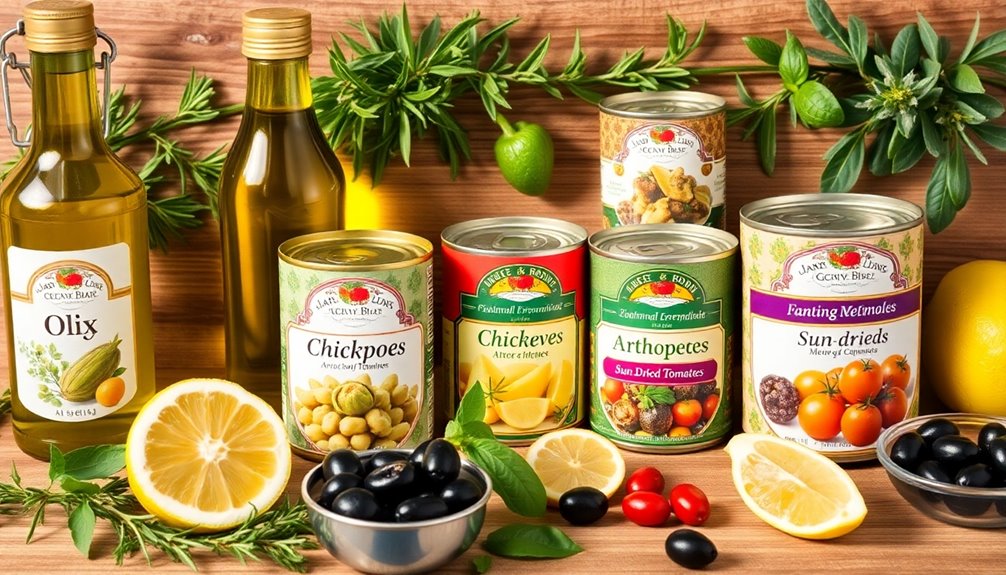
Canned goods offer a convenient way to incorporate a variety of nutritious ingredients into your Mediterranean diet. They're shelf-stable, easy to use, and often packed with flavor. By keeping a selection of canned items on hand, you can whip up healthy meals and snacks in no time.
Here are four essential canned goods you should always have in your kitchen:
- Canned tomatoes: These are a cornerstone of Mediterranean cooking. Whether you choose crushed, diced, or whole, canned tomatoes provide a rich base for sauces, soups, and stews. They're high in antioxidants, particularly lycopene, which has health benefits.
- Olives in brine: Olives aren't only delicious but also a great source of healthy fats. Whether you prefer green or black varieties, they can elevate a simple salad or serve as a tasty snack. Look for options packed in brine for added flavor without extra preservatives.
- Chickpeas: Canned chickpeas are a fantastic protein source. You can toss them into salads, blend them into hummus, or add them to soups for a hearty touch.
- Artichoke hearts: These add a unique flavor and texture to your dishes. They work beautifully in salads, pasta, or as a pizza topping. Additionally, having these healthy recipes on hand can inspire new meal ideas and make it easier to stick to your diet.
Frequently Asked Questions
What Are the Health Benefits of the Mediterranean Diet?
The Mediterranean diet offers numerous health benefits that you'll appreciate. It's packed with anti-inflammatory properties, which can help reduce chronic disease risks.
You'll find that it promotes heart health by lowering bad cholesterol and improving blood pressure. Plus, its nutrient-rich foods support cognitive function, potentially delaying age-related decline.
Embracing this diet not only enhances your overall well-being but also provides long-term benefits, creating a lasting impact on your health journey.
How Can I Adapt the Diet for Vegetarian or Vegan Lifestyles?
You might think the Mediterranean diet isn't for vegetarians or vegans, but that's not true! You can easily adapt it by focusing on plant-based proteins like lentils, chickpeas, and quinoa. Use cooking substitutions, such as replacing dairy with almond milk or tofu. Incorporate plenty of fruits, vegetables, nuts, and whole grains. This way, you'll enjoy the diet's flavors and health benefits while aligning with your lifestyle, creating a sense of belonging in this vibrant culinary tradition.
Is the Mediterranean Diet Suitable for Weight Loss?
Absolutely, the Mediterranean diet can be great for weight loss. By focusing on whole foods like fruits, vegetables, whole grains, and healthy fats, you naturally lower your caloric intake while still feeling satisfied. Studies show this approach supports fat loss without the need for restrictive dieting.
Plus, the emphasis on portion control and mindful eating helps you build a sustainable, healthy relationship with food, making it easier to maintain long-term results.
How Do I Balance Portions While Following the Mediterranean Diet?
Imagine this: you're at a Mediterranean feast, savoring every bite. To balance portions, focus on portion control and meal planning.
Start by filling half your plate with veggies, a quarter with whole grains, and the remaining quarter with lean proteins. Use smaller plates to help manage portion sizes.
Planning your meals ahead allows you to enjoy diverse flavors while staying mindful of quantities. It's about creating a satisfying, healthy relationship with food and community.
Can I Find Mediterranean Diet Staples at Local Grocery Stores?
Yes, you can definitely find Mediterranean diet staples at local grocery stores.
Look for fresh produce, whole grains, and legumes, which are often budget-friendly alternatives to more expensive items.
Many stores now stock olive oil, nuts, and spices that are essential for Mediterranean cooking.
Don't hesitate to ask staff for help locating specific items, as they can guide you to fresh, local options that fit your budget and dietary goals.
Conclusion
By stocking your kitchen with Mediterranean diet staples, you're not just filling your pantry; you're embracing a lifestyle backed by science. Imagine vibrant vegetables, hearty whole grains, and a splash of olive oil dancing together on your plate. Research shows that this way of eating can boost heart health and promote longevity. So, next time you reach for a snack, remember the fresh, wholesome ingredients at your fingertips, and savor the vibrant flavors and benefits they bring to your life.

